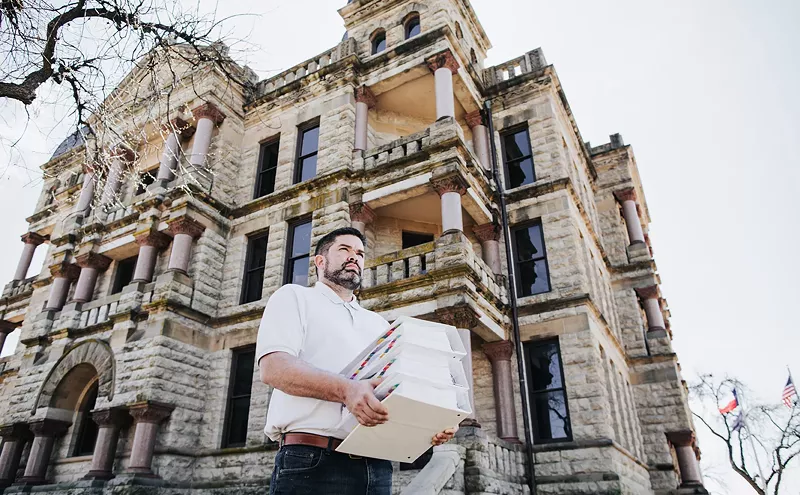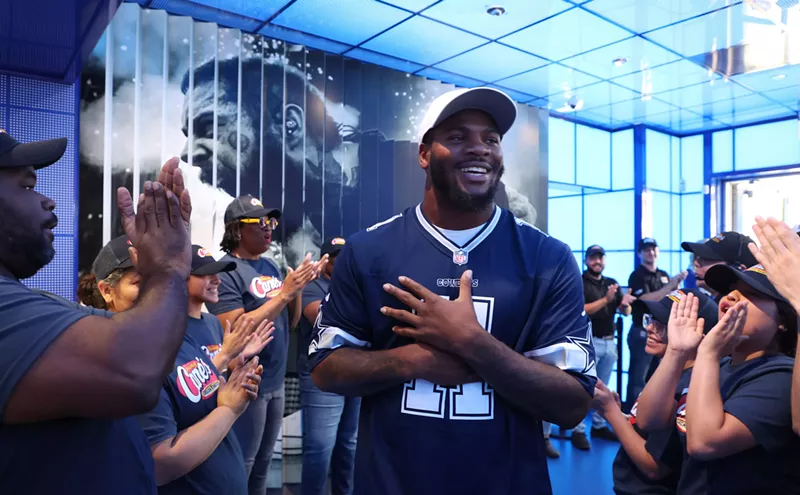We remember what a conversation is, right? More than one voice talking? For the sake of conversation, allow me, if you will, to be the other voice opposed to the unified one-note civic chorale calling for the public hanging of public relations man Mike Snyder, who set up some fake Facebook accounts so he could comment under pseudonyms on blogs on behalf of a client.
To help an attorney representing a downtown condo tower, Snyder created the accounts under false names and then used the accounts to register himself as a commenter on blogs at The Dallas Morning News and at D Magazine, a local publication.
Museum Tower has been locked in a fierce dispute with the Nasher Sculpture Garden over the Nasher's complaint that reflected light from Museum Tower's glass skin is wrecking the Nasher's galleries. On this issue the Dallas establishment has lined up as a monolith to shun Museum Tower, its owners and anyone who speaks for it, just as the establishment in Dallas has lined up over issues from the JFK assassination 50th anniversary to the Inland Port project.
Every story, every column, every blog and every tweet from The Dallas Morning News will sing the same song and espouse the same point of view. Museum Tower must be shunned. As always, the main and most powerful argument is simply that. They are shunned. That is all we need to know, because then we know that if we even listen to them, we will be shunned, too.
In fighting against the shunners, why did Snyder need to post comments with fake accounts? He wouldn't talk to me about it on the record, so I'm left to attack the question more generically. First of all, is there something intrinsically wrong, morally or ethically, with anonymous speech or its trickier cousin, pseudonymous speech, in which the speaker assumes a fake name to further camouflage his own identity?
Hope not. Anonymous and pseudonymous speech are stitched deep in the American concept of free speech, as they were woven into the very origins of our nation. The first public discussion of freedom and liberty in the colonies began when the letters of "Cato" (not his real name) began to appear in American newspapers in 1720.
Tom Paine's pamphlet, "Common Sense," published in 1776, one of the most important sources of the popular concept of American liberty, did not include anywhere on its pages the name Thomas Paine. It was signed "An Englishman."
From the beginning of our nation, American courts and especially the Supreme Court have protected anonymous and pseudonymous speech as essential to the preservation of liberty. The idea has always been that you should be able to challenge the legitimacy of the crown — or even say the king's a fool — and not pay with your head, your livelihood or your freedom.
Of course there are limits on anonymous speech, but they are the same limits imposed on named speech. You can't libel another person or infringe on his copyright or defraud him of money anonymously any more than you could get away with it by giving your right name. But the courts have always held that real damage to a person or to the law is the test for forcing an anonymous person to be named. Not liking what the person has to say is never the test. American law specifically protects anonymous speech when it is attacked merely because someone disagrees with what is said.
Apparently The Dallas Morning News does not afford its readers and the people who access its web pages the same consideration. In fact, its promise to protect the personal information of readers is more like the apple the witch gave to Snow White.
Its original story revealing that Snyder had faked Facebook personae suffered a curious omission. Normally an investigative piece of this type explains exactly how a wrongdoer was caught by reporters, for a host of reasons. Instead, the News story suggested indirectly that reporters had sleuthed out Snyder's fake Facebook characters from emails produced by open records demands.
Snyder did tell me one thing on the record. I asked him if Morning News reporters had told him they had evidence from the newspaper's computer servers proving that he was the commenter who had accessed their blogs under fake names via Facebook. Snyder said, "Yes."
The privacy policy of A.H. Belo Corp., owner of the Morning News, gives the clear impression that Belo will do whatever it can to protect personal information of readers and web page visitors from violation by third parties. Under a heading, "What Safeguards Do We Put in Place to Protect Your Personal Information?" the policy states:
"A.H. BELO maintains reasonable safeguards to protect the security and integrity of the Personal Information that you provide to us. However, no security system is impenetrable and we cannot guarantee the security of our database. Nor can we guarantee that the information you supply won't be intercepted while being transmitted to us over the Internet." I would come away from that statement with the impression the newspaper will do what it can to protect me from prying eyes who might seek to learn or reveal my personal information.
I know of one occasion when we have outed an anonymous commenter at the Observer. In 2010, anonymous comments on our blogs suggested that the local chairman of the Republican Party was the focus of a criminal investigation by Dallas County District Attorney Craig Watkins. We determined that the accusation, which turned out to be untrue, was coming from computers in Watkins' offices. The paper saw a clear public interest in publishing the real identity of the false accuser.
But when we outed Watkins, we revealed immediately in stories and blog posts how and why we did it — by tracing computer IP addresses. The News' story on Snyder made no mention of use of information from the News' servers, although Managing Editor George Rodrigue did admit to it in response to my question.
Rodrigue told me that his reporters' curiosities about Snyder were aroused by similar wording and basic talking points in posts Snyder had contributed both under fake names and his own name. I'm sure that's true. By the way, interested parties comment under fake names all the time on our own blogs here at the Observer — some of them obvious insiders with what is obviously inside information.
It's not just obvious to us that they are insiders. Usually other commenters, who are probably insiders on the other side, spot them before we do and call them out on it.
Rodrigue said, "We then checked our website's system logs and found that Mr. Snyder and the fake posters were all sending us messages from the same IP address, which appeared to be somewhere in Arlington," he said. "Our website's terms of service do not guarantee anonymity, but then again, the internal research we conducted did not involve the disclosure of any personal information about Mr. Snyder. To this day, for instance, we do not know the physical location of the computers involved."
Rodrigue says that the paper traced only Snyder's IP address from its servers. A close reading of the News' privacy policy and terms of service, however, reveals that its servers scoop up immense amounts of information about every single computer that contacts their system, including browser type, browser identifiers, language, plug-ins, Internet domain and operating system, the site you visited before visiting them and the site you visited after leaving, content and advertisements you view and links you click on while navigating within their services, and unique identifiers including mobile device identification numbers that can pinpoint your physical location. Taken en masse, this information amounts to a unique fingerprint for every computer that reaches the Morning News.
I asked Rodrigue why the paper thought it was fair play to use information from its servers to out Snyder but made no equivalent effort to out another frequent pseudonymous commenter, "Wylie H.," a fake-name warrior who fights on the side of the Nasher. By the way, my own very inexpert Internet sleuthing last week showed me that Wylie H. has accessed Facebook from within City Hall but also from within The Dallas Morning News building.
"I can say that we see many differences between Wylie H. and Mr. Snyder," Rodrigue said. He said first of all that because Wylie H. fights on the side of the Nasher, not Museum Tower, he is not connected with a public institution. But Museum Tower is a private, ultra-luxe condo building for rich people. The argument that it is a government agency because it was funded by the Dallas police and fire pension fund is specious.
Rodrigue also said this of Snyder: "His fake people were ganging up on real people, in our comments area."
That brings us to the issue of fake people. Why did Snyder create fake people on Facebook? He wouldn't tell me on the record, so I will surmise.
The News, D Magazine and the Dallas Observer invite you to comment anonymously on their blogs. The only way you can do so at the News is by registering through Facebook. Making up a fake Facebook identity is a violation of Facebook's terms of service but not the law. A person might go the extra step of creating a fake Facebook persona to register, in addition to using a fake comment name, because that person did not trust the Morning News not to look back at his Facebook account and out him with it.
So who turned out to be wrong about that one?
I don't know Snyder. I'm not a great fan of scorched-earth public relations, mainly because it makes more work for me. But in Dallas, you always have to ask the question, who scorched the earth first? If you're the shunned person and you see the earth-scorchers at the Morning News and City Hall and the Dallas Citizens Council coming at you, what do you do? Maybe you call Mike Snyder.












